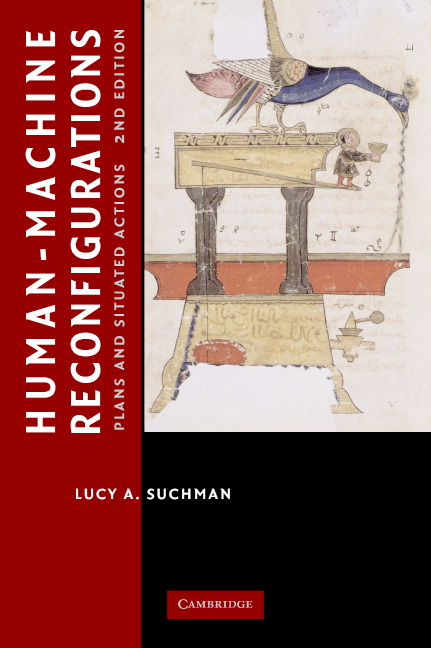Lucy Suchman: Human-Machine Reconfigurations: Plans and Situated Actions, 2nd ed (2007)
Filed under book | Tags: · anthropology, artificial intelligence, cognitive science, computing, ethnomethodology, human-computer interaction, interface, machine, robots, software, technology

“This 2007 book considers how agencies are currently figured at the human-machine interface, and how they might be imaginatively and materially reconfigured. Contrary to the apparent enlivening of objects promised by the sciences of the artificial, the author proposes that the rhetorics and practices of those sciences work to obscure the performative nature of both persons and things. The question then shifts from debates over the status of human-like machines, to that of how humans and machines are enacted as similar or different in practice, and with what theoretical, practical and political consequences. Drawing on scholarship across the social sciences, humanities and computing, the author argues for research aimed at tracing the differences within specific sociomaterial arrangements without resorting to essentialist divides. This requires expanding our unit of analysis, while recognizing the inevitable cuts or boundaries through which technological systems are constituted.”
Publisher Cambridge University Press, 2007
Learning in Doing: Social, Cognitive and Computational Perspectives series
ISBN 052167588X, 9780521675888
314 pages
Stephen Ramsay: Reading Machines: Toward an Algorithmic Criticism (2011)
Filed under book | Tags: · algorithm, digital humanities, literary criticism, machine, pataphysics, text, turing machine

“Rethinking digital literary criticism by situating computational work within the broader context of the humanities
Besides familiar and now-commonplace tasks that computers do all the time, what else are they capable of? Stephen Ramsay’s intriguing study of computational text analysis examines how computers can be used as “reading machines” to open up entirely new possibilities for literary critics. Computer-based text analysis has been employed for the past several decades as a way of searching, collating, and indexing texts. Despite this, the digital revolution has not penetrated the core activity of literary studies: interpretive analysis of written texts.
Computers can handle vast amounts of data, allowing for the comparison of texts in ways that were previously too overwhelming for individuals, but they may also assist in enhancing the entirely necessary role of subjectivity in critical interpretation. Reading Machines discusses the importance of this new form of text analysis conducted with the assistance of computers. Ramsay suggests that the rigidity of computation can be enlisted by intuition, subjectivity, and play.”
Publisher University of Illinois Press, 2011
Topics in the Digital Humanities series
ISBN 0252078209, 9780252078200
98 pages
Review: Matt Schneider (Digital Studies).
Comment (0)Donald MacKenzie: Knowing Machines: Essays on Technical Change (1996)
Filed under book | Tags: · economics, machine, nuclear weapons, sociology, sociology of technology, tacit knowledge, technology

Ranging from broad inquiries into the roles of economics and sociology in the explanation of technological change to an argument for the possibility of “uninventing” nuclear weapons, this selection of Donald MacKenzie’s essays provides a solid introduction to the style and substance of the sociology of technology.
Two conceptual essays are followed by seven empirical essays focusing on the laser gyroscopes that are central to modern aircraft navigation technology, supercomputers (with a particular emphasis on their use in the design of nuclear weapons), the application of mathematical proof in the design of computer systems, computer-related accidental deaths, and the nature of the knowledge that is needed to design a nuclear bomb. Two of the articles won major prizes on their original journal publication. A substantial new introduction outlines the common themes underlying this body of work and places them in the context of recent debates in technology studies.
Publisher MIT Press, 1996
Inside Technology series
ISBN 0262133156, 9780262133159
338 pages
review (Brian Martin, Metascience)
Comment (0)
